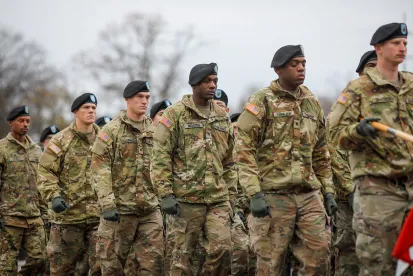n January 20, 2023, San Francisco Mayor London Breed approved a city ordinance that will require large, private employers to provide differential paid leave for military reservists called up to active duty. The “Military Leave Pay Protection Act” adds Article 33Q to the city Police Code, and will make San Francisco the first jurisdiction in the United States to require that private employers provide differential paid leave to employees who are members of the military while they perform military service, the sponsor of the ordinance said when introducing it last year.
The approval comes after the San Francisco Board of Supervisors initially passed the ordinance in December 2022. The ordinance will go into on February 19, 2023.
Paid Leave
The ordinance will require private employers with one hundred or more employees, “regardless of location,” to pay military member employees the difference between their military pay and the amount of pay they would have received from their employers working their “regular work schedule … excluding overtime unless regularly scheduled,” while they are called for “[m]ilitary [d]uty.” Employees will be able to take military duty paid leave in “daily increments for one or more days at a time, for up to 30 days in any calendar year.” The requirements apply to employees who work within the boundaries of San Francisco, including part-time and temporary employees, and who are members of the “reserve corps of the United States Armed Forces, National Guard, or other uniformed service organization of the United States.”
“Military Duty”
The ordinance defines “military duty” as “active military service in response to the September 11, 2001 terrorist attacks, international terrorism, the conflict in Iraq, or related extraordinary circumstances, or military service,” including to provide support for responding to the COVID-19 pandemic or natural disasters. It also includes being called up for “military training, drills, encampment, naval cruises, special exercises, Emergency State Active Duty, or like activity.”
If an employee does not return to the job within sixty days after being released from military duty, the employer will be allowed to treat the differential compensation paid as a loan with “interest at a rate equal to the minimum amount necessary to avoid imputed income” under the Internal Revenue Code of 1986. In such cases, interest would begin to accrue ninety days after the later of either the employee’s release from military duty or return to fitness for employment, and the loan would be payable in equal monthly installments over a period of no longer than five years.
Collective Bargaining Waiver
The ordinance will not apply to employees covered by a “bona fide collective bargaining agreement” (CBA) to the extent that the requirements under the ordinance are “expressly waived in the [CBA] in clear and unambiguous terms.” At the same time, the ordinance will not prevent an employer from “adopting or retaining military leave policies that are more generous” than what the ordinance provides.
Enforcement
Under the ordinance, the Office of Labor Standards and Enforcement (OLSE) will be tasked with implementation and enforcement. “The City, or any person or entity acting on behalf of the public as provided for under applicable State law” will be empowered to bring a civil action against an employer or other person who violates the ordinance.
The ordinance will further allow an individual who alleges he or she was aggrieved by a violation of the ordinance to bring a civil action for relief so long as the individual provides written notice to the City of San Francisco of an intent to sue, and the city informs the person in writing that it is not initiating an enforcement action and “has determined that no violation occurred.”
A party prevailing in a civil action will be able to recover “such legal or equitable relief as may be appropriate to remedy the violation,” including, but not limited to the payment of the differential pay “unlawfully withheld.” The party also may recover liquidated damages in the amount of $50 for each aggrieved employee for each day the employee’s rights were violated. Employers may also be ordered to pay the amount of compensation unlawfully withheld “multiplied by three” or $250, whichever is greater.
Key Takeaways
While federal law, namely the Uniformed Services Employment and Reemployment Rights Act of 1994 (USERRA), provides for unpaid military leave and requires that service members be restored to their same jobs and benefits following military service, private-sector employers have not been required to offer paid leave to service members during active duty. The San Francisco ordinance will make the city one of the first jurisdictions—if not the first—to require private-sector employers to provide paid military leave.





 />i
/>i

